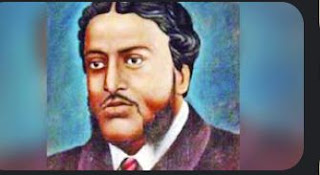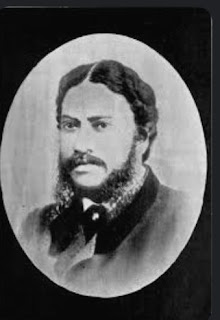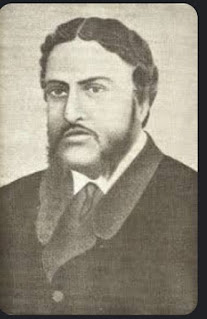MICHAEL MADHUSUDAN DUTT BIOGRAPHY, AGE EARLY LIFE, CAREER, ACHIEVEMENTS AND LIFESTYLE
Michael Madhusudan Dutt, born on January 25, 1824, in Sagordari, Jessore district (now in Bangladesh), was a pioneering figure in Bengali literature and a trailblazer in the realm of Indian English poetry. His life and works epitomize the fusion of Eastern and Western literary traditions, reflecting the tumultuous socio-cultural landscape of 19th-century colonial India.
EARLY LIFE AND EDUCATION
Michael Madhusudan Dutt was born to a Bengali Christian family, his father, Rajnarayan Dutt, being a prominent lawyer. Despite his Christian upbringing, Dutt was deeply influenced by Hindu mythology and literature, which would later find expression in his poetry. He received his early education in Bengali, Persian, and Sanskrit, displaying remarkable linguistic prowess from a young age.
In 1833, at the age of nine, Dutt was sent to Calcutta (now Kolkata) for his education, where he excelled in academics and extracurricular activities. He later pursued higher studies at Hindu College (now Presidency University), where he delved into English literature and began experimenting with poetry in English.
LITERARY CAREER
Michael Madhusudan Dutt's literary career can be divided into two distinct phases: his early period marked by his contributions to Bengali literature, and his later period characterized by his pioneering efforts in Indian English poetry.
In his early years, Dutt gained acclaim for his Bengali works, including the epic poem "Meghnad Badh Kabya" (The Slaying of Meghnad), which remains a landmark in Bengali literature. Written in blank verse, the poem reimagines the story of the Ramayana from the perspective of the antagonist, Meghnad (Indrajit), son of Ravana. Through this work, Dutt challenged traditional literary conventions and introduced innovative narrative techniques, earning him the title of "Kobi Michael" (Poet Michael) among Bengali literary circles.
However, it was during his later years that Dutt achieved international recognition for his contributions to Indian English poetry. Inspired by the works of English Romantic poets such as Byron, Shelley, and Keats, Dutt began writing poetry in English, breaking new ground in a literary landscape dominated by colonial voices.
His most notable work in English is the epic poem "The Slaying of Meghanada," an English rendition of his earlier Bengali epic. Written in Spenserian stanza, the poem blends Indian mythology with Western poetic forms, showcasing Dutt's mastery of both traditions. "The Slaying of Meghanada" is hailed as a landmark in Indian English literature, pioneering the genre of Indo-Anglian poetry and inspiring subsequent generations of Indian poets writing in English.
PERSONAL LIFE AND TRAGIC END
Despite his literary success, Michael Madhusudan Dutt's personal life was fraught with turmoil and tragedy. He faced financial difficulties and struggled to find recognition for his English works in colonial society, which often dismissed Indian voices as inferior.
Dutt's personal life was also marred by romantic entanglements and strained relationships. His ill-fated love affair with Henrietta Sophia White, a European woman, led to social ostracism and further exacerbated his emotional turmoil.
In 1864, devastated by personal and professional setbacks, Dutt left India for Europe in search of literary recognition and financial stability. However, his health deteriorated rapidly, and he succumbed to tuberculosis on June 29, 1873, in Calcutta, at the age of 49.
LEGACY
Michael Madhusudan Dutt's legacy extends far beyond his own lifetime, influencing generations of poets and writers in India and abroad. His pioneering efforts in both Bengali and English literature shattered linguistic and cultural barriers, paving the way for a rich tradition of Indian writing in English.
Dutt's fearless experimentation with form, language, and theme continues to inspire contemporary poets and scholars, reaffirming his status as a visionary literary figure. His works remain essential reading for anyone interested in the intersection of Eastern and Western literary traditions and the complex dynamics of colonial-era Indian society.
In recognition of his contributions to literature, several institutions and literary awards have been named in honor of Michael Madhusudan Dutt, ensuring that his legacy endures for generations to come. As one of the pioneers of modern Indian literature, Dutt's legacy serves as a reminder of the transformative power of art and the enduring relevance of voices that dare to challenge the status quo.
















0 Comments